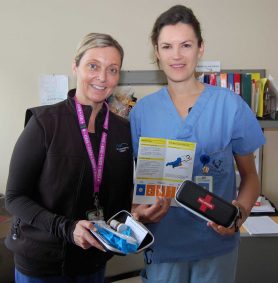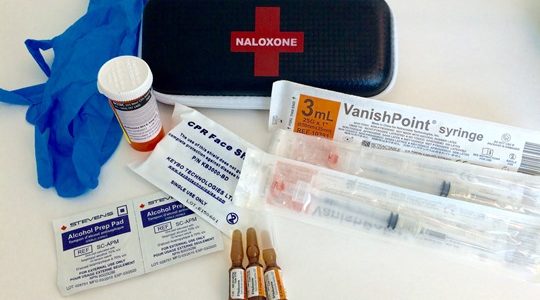Lions Gate Hospital ED now dispensing Naloxone take-home kits
Already widely available for free at primary care sites in the community and at pharmacies for a fee, Naloxone take-home kits will start to be dispensed at Emergency Departments across VCH.
Lions Gate Hospital’s ED began offering Naloxone take-home kits June 21 after staff completed a short training session. Emergency departments at Vancouver General Hospital and Richmond Hospital will be the next sites where staff will be trained to dispense the kits.
St. Paul’s Hospital was the first ED in the Lower Mainland to dispense kits. In the last month, it has dispensed 38 kits.
What is Naloxone?
Naloxone, or Narcan, is a medication that reverses the effects of an overdose from opioids (i.e. heroin, methadone, morphine, oxycodone and fentanyl.) Giving naloxone can prevent death or brain damage from lack of oxygen during an opioid overdose. It does not work for non-opioid overdoses such as cocaine, ecstasy, GHB or alcohol. Naloxone has been used in Canada for more than 40 years and is on the World Health Organization List of Essential Medicines.
The addition of EDs in the Take Home Naloxone (THN) Program is in response to the surge in drug-related overdose deaths across the region associated with fentanyl. In April, B.C. declared a public health emergency after another spike in drug-related overdoses and deaths.
In fact, the number of overdose deaths in which fentanyl was detected jumped by 1,346 per cent from 2012 to mid-point 2016, according to a provincial coroner’s service report.
EDs key dispensing sites
Dr. Mark Lysyshyn, Medical Health Officer for the North Shore and Sea-to-Sky region, says emergency departments are strategic dispensing sites for two reasons.
“People who have survived an overdose are at high risk of dying from a subsequent overdose,” says Mark. “This makes the emergency department a key site for giving people Take Home Naloxone and making sure they know how to use it. It can be a real teachable moment.”

LGH nurse clinician Susanne Scott and RN Sally Kupp with a Naloxone kit.
Emergency nurse clinician Susanne Scott and ED RN Sally along with a group of ED nurses who were involved in the initial blitz session have trained over 90 ED staff members at LGH. So far, the department has dispensed four kits.
“Once word gets out we anticipate an increase in requests for the kits,” says Susanne. “You think you wouldn’t see as much of a need for this on the North Shore, but we do. It’s a real health care crisis.”
The kits, however, are not simply handed over when an individual walks through the ED doors.
911 first step overdoses
“When a person comes in and requests a kit, they will get triaged and trained,” explained Susanne. “Our goal is to train the opioid users with their families or friends together. But calling 911 is the first and most critical step of overdose response.”
Inpatients can receive kits as well.
Sally, who also works shifts at Insite, the supervised injection site on East Hastings, says the THN kits are often a first step for opioid users to take control of their health.
“We have asked people what difference it makes for them to be trained to use the Naloxone kits and they have told us that it helps them save those they care about, gives them access to knowledge, and empowers them to take charge of their own health care,” Sally says.
There are currently 269 locations in B.C. where Naloxone kits are available. For more information on B.C.’s THN Program, visit the Toward the Heart website or click here.

